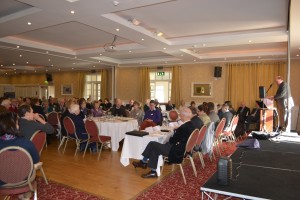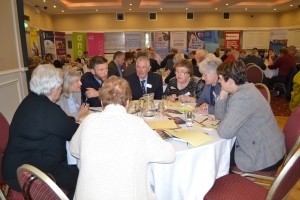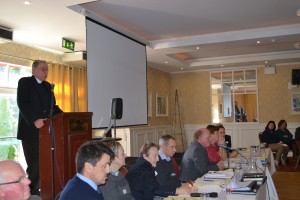Diocesan Synod, Bishop Ferran’s Presidential Address
Members of Synod, I want to welcome you today. This is a triennial Synod and I want to acknowledge those who have served in various capacities in the past three years. To those elected and appointed for the incoming three years I offer my thanks and prayers. May I also welcome our guests from other churches, commissions and fellowships. You are most welcome. It is also good to have many of our friends from different church agencies who provide a valued role in our Synod at their stands.
Last year, as I started my episcopal ministry among you, I determined to do three things: to look, listen and learn. In so doing, I invited various stakeholders in the Dioceses to a series of Conversation Days: clergy and laity from each parish, lay and parish readers from across the Dioceses and young people from YKEA. What emerged from these conversations was a vision of what God was doing among us and where that was leading us under God. I have written about this in The Scribe, shared it at Council meetings and among Clergy and Lay ministers.
Now I want to share this Vision with you and it begins with God.
What is God’s vision for His church? To answer this we need to go back to the beginning of the church in the New Testament. In the Book of Acts, the early church, in spite of its excesses and failures, laid a template of what it is to be a living church. In Acts 2: 42-47 we see the marks of a living church.
A living church is a learning church. Its pastors teach and preach from the Scriptures. Its parents teach their children the Scriptures at home. Its members read and reflect on the Scriptures daily in order to grow in the faith.
A living church is a caring church. Those early Christians loved and cared for each other. Their lives were marked by generosity.
A living church is a worshipping church. Their worship was formal and informal, reverent and joyful. The quality of their worship acted like a magnet and drew others in.
A living church is an evangelizing church. The early church reached beyond themselves into an uncertain world. In fact in only thirty years the early church changed the world for all time with the message and love of Jesus.
God’s vision of His church has to do with relationships. A living church is an Apostolic church, which relates to the teaching of the Apostles. Secondly, a living church relates to each other, it is a caring and sharing church. Thirdly, a living church relates to God, in worship and service. Lastly, a living church relates to the world beyond in witness and action.
This is God’s vision for the church, our church and the churches in Kilmore, Elphin and Ardagh.
Vision is about seeing clearly, seeing things as they are and seeing ahead. Opticians talk about 20/20 vision, meaning clarity of vision which the average person sees at 20 feet or 6 metres. Having looked at God’s vision for the church in the New Testament and having listened to what came out of the Conversations, which were reported in The Scribe and Councils, I want to offer you a 20/20 Vision for the church in Kilmore, Elphin and Ardagh. The 20/20 Vision looks something like this:
Each local church should be a community which nourishes growth through worship, the Scriptures and prayer.
Each local church should be welcoming, caring and generous in raising and resourcing ministry and mission.
Each local church should be a place where ministry and mission is for all: clerical and lay, young and old. People should be trusted and trained for service within and outside the church.
Each local church should be world looking, visible and active in the community and beyond.
Each local church should be connected in prayer and partnership with each other and the worldwide church.
Each local church should prioritize children, from pre-school to third level, passing on the faith to successive generations.
Diocesan administration and structures should be relevant, accountable, representative and supportive of the local church. Diocesan resources should be released to this end.
This 20/20 Vision is a journey of what we want to be and look like by the year 2020.
How will it be realized? Already, I have asked a number of small working groups to think through the areas of administration and both clerical and lay ministries. Other groups will follow. Each working group will report back to the Diocesan Councils, who will then take the necessary decisions to forward the 2020 Vision proposals.
As your Bishop, I intend to visit each group of parishes in 2015, to share the vision and encourage a response on the ground. All this will not happen overnight; the issues will be considered, discussed and prayed through together.
It is the direction in which we are going, over the next five years to 2020. This is the Vision, the 20/20 Vision.
To return to the present, I want to thank various people.
I want to thank our clerical team for their selfless service for the Lord. I make an appeal to all to support and encourage them in their demanding work. We are privileged to have such a team in the Diocese, with privilege comes responsibility.
We said farewell to some of our clergy in the past year. To our beloved Dean Raymond Ferguson, whose godly ministry touched so many.
To the energetic Canon Derek Swan who in retirement has taken on a fresh challenge in Tuam Diocese.
We welcome the Rev. Linda Frost, ordained to serve in the South Leitrim Group of Parishes and the Rev. Ian Horner, ordained to serve in the Bailieborough Group of Parishes. Olivia Downey, an ordinand from our Diocese, was ordained in Tuam to serve in the Westport Group of Parishes.
Likewise I pay tribute to our expanded group of Diocesan Lay Readers whose ministry is vital in the Diocese. They are complimented by a growing number of parish readers whose ministry is greatly valued. The recent Resources Day brought together around one hundred people from across the Diocese, eager to develop skills, to receive training and information in order to resource their local church.
I want to convey our thanks to the Diocesan administration team. To the two Archdeacons, Craig and Ian, to Brigid, Maud and Ann as secretaries and to the treasurers: Des Lowry, William Forster, Canon Billy Stafford and John Davies. Their tireless work on our behalf is considerable and appreciated. To the many who contribute and colour the life of the Dioceses, on Councils, Committees, School Boards, and ministries – we say thank you for your devoted service. Today we remember with gratitude Dorothy Burns from Longford, who served the Dioceses faithfully for so many years. We also pay tribute to Robert Thompson from Killesher Parish who has stepped down from the Kilmore Council after many years of sterling service.
I have been focusing much of this address on Vision. I leave you with words from Proverbs 29:18 in the Old Testament. They are words for our time from The Message:
If people can’t see what God is doing, they stumble all over themselves; But if they attend to what he reveals, they are most blessed.
+ Ferran



